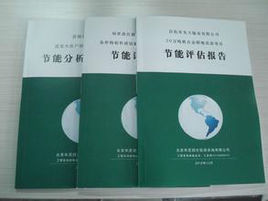Energy conservation assessment report refers to the energy conservation assessment report, energy conservation assessment report form or energy conservation assessment registration form issued by a qualified unit based on the energy conservation assessment of the project. Energy conservation assessment refers to the analysis and assessment of whether the energy utilization of investment projects is scientific and reasonable according to energy conservation laws, regulations and standards. For fixed asset investment projects with an annual comprehensive energy consumption of more than 3000 tons of standard coal (including 3000 tons of standard coal, and the power conversion coefficient is based on the equivalent value, the same below), or an annual power consumption of more than 5 million kilowatt hours, or an annual oil consumption of more than 1000 tons, or an annual natural gas consumption of more than 1 million cubic meters, a separate energy conservation assessment report shall be prepared.

Gansu Energy Conservation Assessment Report Purpose and significance of writing:
(1) Evaluate and analyze whether the project meets the requirements of national and local laws, regulations, plans, industrial policies, industry access conditions and relevant standards and specifications.
(2) Evaluate whether the project process and process equipment are advanced and feasible in terms of energy consumption.
(3) This paper expounds the design energy use of construction projects, objectively and comprehensively analyzes the advanced points and weak links of reasonable energy use of projects with scientific and rigorous assessment methods, judges the policy compliance, scientificity and feasibility of reasonable energy use of projects, and puts forward suggestions and measures for reasonable energy use.
(4) According to the conclusions and recommendations of the energy conservation assessment, in order to achieve the national and local macro policy objectives on energy conservation and emission reduction, strengthen the management of rational energy use of projects and strictly control energy conservation from the source.









